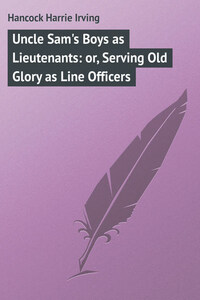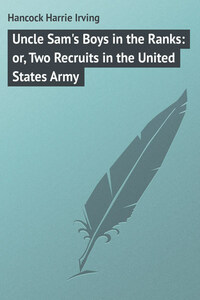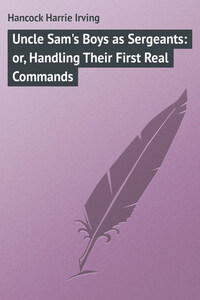CHAPTER I
THE LETTER FROM THE WAR DEPARTMENT
"WHEW, but it's hot here!" grumbled Sergeant Noll Terry, of the United States Army.
"That's an odd complaint to hear from a young man who served so actively for two years in the tropics," laughed Mrs. Overton, a short, plump, middle-aged matron.
"Well, Mother, it is a hot day," put in Sergeant Hal Overton quietly.
"Yes, it is," agreed Hal's mother, "though you two, who came from the Philippines the very picture of health can't feel the weather to-day much. New Jersey isn't in the tropics."
Hal's mother said that with an air of finality. Her son and his chum had been through the most strenuous forms of active army service in Uncle Sam's colonial possessions, the Philippine Islands. If they could endure the heat in that tropical belt, even that day's broiling weather at home must seem cool by comparison.
"I suppose you have an idea, Mother, that the nearer you go to the equator the hotter the weather gets."
"Well, isn't it so?" challenged Mrs. Overton.
"It may be, as far as actual degrees of heat are marked off on the thermometer," explained Sergeant Hal. "But I'll stick to it, Mother, that the average of weather that we struck in the Philippines was not nearly so disagreeable as the weather is here to-day."
"That's so," nodded youthful Sergeant Terry, with emphasis.
"I don't understand that," replied Mrs. Overton, looking a good deal puzzled.
"I don't pretend to understand it, either, Mother," Hal continued. "But it's a fact that there are very few spots in the actual tropics that seem so disagreeable as are New York City and some places in New Jersey in the heated terms of July and August."
"That astonishes me," declared Mrs. Overton. "I have always supposed that, the further south one goes in summer, the hotter one finds it. So New York City is hotter in summer than the tropics?"
"It seems hotter," Sergeant Hal affirmed.
The boys were more or less inclined to joke Mrs. Overton, because, while there are many pleasant days in the tropics, particularly near the coast, the weather is for the most part undeniably hot and oppressive.
"Anyhow," remarked Noll, philosophically, "the hardest thing we have to do here is to walk a short distance down the street and buy another ice cream."
"I'd rather be working," retorted Hal quickly. "I'd rather be doing anything than lying idly around like this!"
"Henry!" cried his mother reproachfully. She was sure to be hurt or angry when she addressed him so formally. "Don't you care anything about being at home, after you've been away from us for more than three years?"
"Of course I care about being home, Mother," Sergeant Hal made haste to rejoin, as he rose, went over and kissed her. "But I don't believe you can gain a hundredth of an idea as to the suspense Noll and I are under at present. When we get our orders from the War Department we'll know – one way or the other."
"Oh, you're safe enough for your commission as second lieutenant, Hal," Noll broke in. "I only wish I felt half as safe for myself as I do for you."
"It doesn't seem fair that you shouldn't both get your commissions as second lieutenants," murmured Mrs. Overton. "You're both certain that you passed your final examinations at Fort Leavenworth."
"We'd both get our commissions, Mother, if there were vacancies enough. However, this year fifty-nine young soldiers passed their final examinations, and there are only forty-two vacancies to be filled from the ranks. Consequently, seventeen of us – "
"It isn't fair," broke in Mrs. Overton, with all a mother's logic where her son is concerned. "All of you who passed ought to be appointed officers in the Army."
"Seventeen of us won't be," sighed Hal.
Ever since their first enlistment Hal and Noll had been imbued with the ambition to rise from the ranks, and become officers. This promotion from the ranks is not as simple a matter as young people might gain from reading the stories of some misinformed authors who know nothing of actual military service. The enlisted man who would rise from the ranks must first of all be sure that his military record is fine and clean, and that his reputation for coolness and bravery is firmly established. But this is only the beginning for the ambitious soldier in the ranks. He must study almost incessantly, for, when his turn comes to be promoted to a second lieutenancy, he must be fitted to take a stiff academic examination and pass it with credit. That examination, in Sergeant Noll's grim description, "is enough to make a college professor's hair turn gray." There is no easy way of rising from the ranks to become an officer.
Hal and Noll, following the method provided by law, had gone up for their preliminary examinations in the Philippines. Both had succeeded in passing, though Noll was much nearer the bottom of the list than his chum. Then, a good many months later, both young sergeants had been ordered home from the Philippines, that they might undergo their final examination for commissions. As they were "up" for commissions in the infantry arm of the service, these two youthful soldiers were sent before a board of Army officers at Fort Leavenworth. In the interval between the examinations both young soldiers had studied harder than ever. They believed that they had passed these final examinations in July. They had then been ordered to their homes to await the action of the War Department. It was now well along in August.














